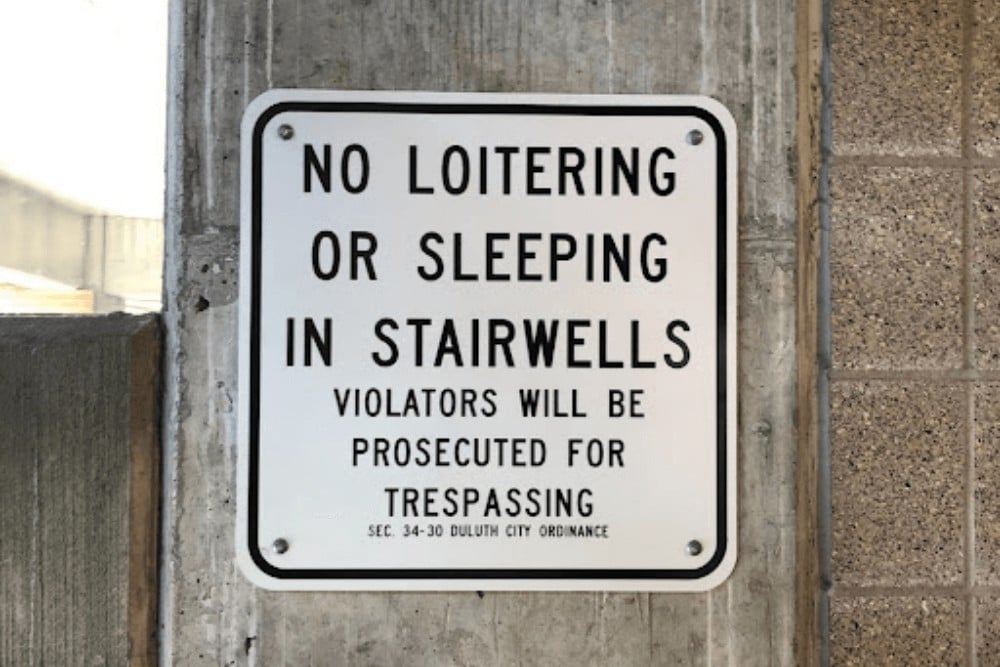What to Do If Someone Is Loitering on Your Private Property

It’s a widespread issue. Some might consider it no big deal, while others—especially business owners—know from experience the hassle and frustration it can cause, to say nothing of the potential for lost revenue and reputation.
Loitering.
It may seem harmless enough at first glance, but loitering on private property can quickly get out of hand when left unchecked. As the saying goes, give them an inch and they’ll take a mile. Allow a couple of teenagers on Monday, and you may have five on Tuesday, and then 10 by the end of the week. Loitering breeds more loitering. It’s best to be proactive and consistent.
But what exactly is loitering, and how can we prevent and deal with it?
What Constitutes Loitering?
Loitering is typically a municipal ordinance rather than a state or federal law, but almost every jurisdiction will have something on its books to keep it in check.
At its simplest, loitering is hanging around in a particular place for a prolonged time without any apparent purpose. “Without purpose” is key. Stepping outside of a bar for a cigarette is not loitering. Leaning against a fence to watch a little league baseball game is not loitering.
Think kids in a parking lot or in front of a convenience store. That’s loitering.
It may seem rather benign, and it very well might be sometimes, but loitering on private property is often a precursor to more serious issues. These could include public drinking, vandalism, drug dealing, begging, harassment, prostitution, and robbery.
But is it a criminal offense?
Is Loitering a Crime?
The short answer: It depends.
Some places may have a local bylaw criminalizing loitering itself. It is more common to see it described as loitering with the intent of committing a crime.
In California, for example, it is a misdemeanor crime under penal code 647(h) for anyone:
Who loiters, prowls, or wanders upon the private property of another, at any time, without visible or lawful business with the owner or occupant. As used in this subdivision, “loiter” means to delay or linger without a lawful purpose for being on the property and for the purpose of committing a crime as opportunity may be discovered.
Falling under the umbrella of disorderly conduct, a conviction is punishable by a fine of up to $1,000 and/or jail time of up to one year.
It’s difficult to find any reason for loitering on private property other than criminal intent, and local laws reflect that. But making something illegal doesn’t necessarily stop it from happening, as we all know too well.
How to Stop Loitering
When it comes to safety and security, it’s better to be proactive rather than reactive. Anticipate and mitigate. So how can you prevent loitering before it happens? You protect yourself, your property, and your business as though it’s going to happen.
And remember, it is easier to discourage loitering in the first place than it is to stop it once individuals have settled on a spot. Be consistent and take a zero-tolerance approach.
Hang a Sign
File this method under cheap and easy. A simple “No Loitering” sign is an effective deterrent, and it removes the “I didn’t know” defense. Go a step further and add “Violators will be prosecuted” or “Police enforced.” These hammer home the idea that you take the protection of your property and business seriously and won’t stand idly by while crime happens. If your municipality has a specific regulation against loitering on the books, mention that ordinance by name.
An effective sign makes it crystal clear that:
- loitering is prohibited,
- loitering is a crime, and
- those loitering will be dealt with to the full extent of the law.
A sign is often enough to make would-be loiterers move on to another location with no such signage. As a bonus, police can intervene on your behalf if they see people hanging around under or by a “no loitering” sign, whereas they need probable cause that a crime may take place before acting without such a sign.
Make It Bright
An equally simple solution is to ensure adequate lighting around your property. This not only makes it less appealing for loitering—no one wants to hang out under a spotlight—but is a powerful deterrent for other crimes as well. Criminals prefer to operate under cover of darkness, so eliminate dark corners, stairwells, and parking areas.
Proper lighting makes it less difficult to see what’s going on for you, passers-by, the authorities, and any security cameras you have installed (more on that below).
Hang a sign, and light it up.
Access Control
One of the pillars of crime prevention through environmental design (CPTED), natural access control refers to the deliberate use of fences and other borders like shrubs or hedges to clearly indicate where someone can and can’t be.
For example, someone standing in front of a window may arouse suspicion, but they may not. However, someone standing in a flower bed in front of that same window will definitely stick out. They shouldn’t be there, and that’s obvious to even the most casual observer.
Control access to the places people may congregate, and you’ll reduce loitering before it happens. Strangers have to ignore the signs, fences, and borders in order to loiter. That makes it that much easier for you to ask them to leave or notify the authorities.
Territorial Reinforcement
Another pillar of CPTED, territorial reinforcement relies on the fact that if a property or premise looks well-maintained and taken care of, people treat it that way, too.
Remove graffiti as soon as it appears. Replace burnt-out light bulbs immediately. Clear trash and other debris.
If it looks run-down if not abandoned, few will care if they notice a group loitering there. But if it’s well-lit and clean with obvious upkeep, it’s a very loud signal to everyone that this space belongs to someone and that they are invested in protecting it and keeping it safe.
Think Outside the Box
There are many creative solutions to prevent loitering on private property.
Some convenience stores have experimented with playing classical music out front, which seems to keep teenagers from setting up shop. Others have tried broadcasting a continuous tone at a frequency only heard by those under 20 years of age, with similar results.
In Calgary, Canada, local police services have had success using energy-efficient low-pressure sodium (LPS) lighting in areas frequented by prostitutes. These bulbs give an unattractive paleness to anyone underneath them. Exposure for longer than 20 minutes can also trigger headaches in some people.
The trick is to find something that works and does not negatively affect legitimate customers or visitors. So experiment.
How to Deal with Loitering
No matter what steps you take to prevent it, you may still have to deal with loitering. Nothing is 100% effective 100% of the time. So what do you do then?
Treat loiterers with respect regardless of whether it’s a group of teenagers, a homeless individual, or other adults. Aggression will usually be met with aggression, and you don’t want to escalate the situation and put yourself or your staff in danger. If you’ve hung a sign and people choose to ignore it, you can calmly and quietly remind them that loitering is not allowed and ask them to move on. That should be enough in a perfect world.
But it’s not a perfect world, and you may not want to approach the group. You could call the police, but depending on how busy they are, they may not be much help for such a low-priority request.
If it’s available, and you can afford it, hire security personnel or a mobile patrol. They can more adequately handle loitering when they see it. However, that may be prohibitively expensive. A more affordable but no less powerful option is to install security cameras with professional monitoring.
Security Cameras
Visible security cameras—either wired or wireless—are a powerful deterrent just by their presence. Most will not choose to stay in a location being watched. Combine that with active monitoring, and you can prevent and deal with loitering as necessary.

With Deep Sentinel, live security surveillance guards are notified by intuitive AI. They can then assess the situation, intervene via 2-way audio—instructing the loiterers to disperse—and/or notify the authorities as a last resort. And all of that happens within 30 seconds.
Cameras deter unwanted behavior while live guards deal with the situation as it occurs. You’re covered, 24/7.
Whether at home or your business, loitering on your private property is bound to happen at some point. A “No Loitering” sign, a security camera with live monitoring, and adequate lighting are your best defense and offense.
Stop loitering before it happens, and deal with it professionally and humanely when it does.
Need a Solution that Prevents Crime?
Deep Sentinel is the only security technology that delivers the experience of a personal guard on every customer’s home and business. Visit deepsentinel.com or call 833-983-6006

